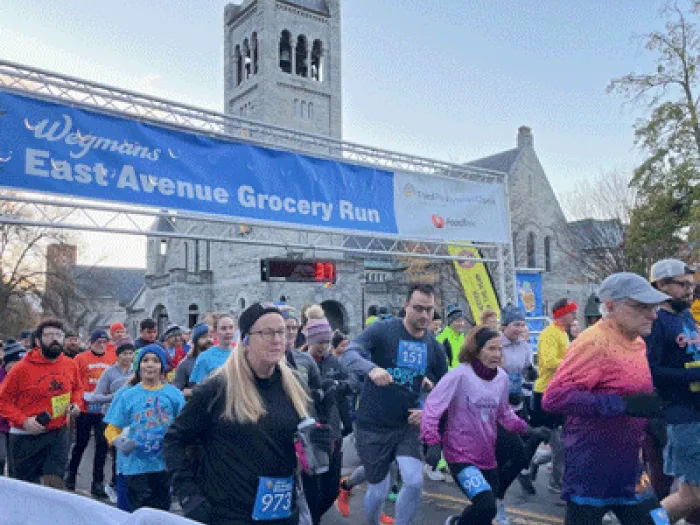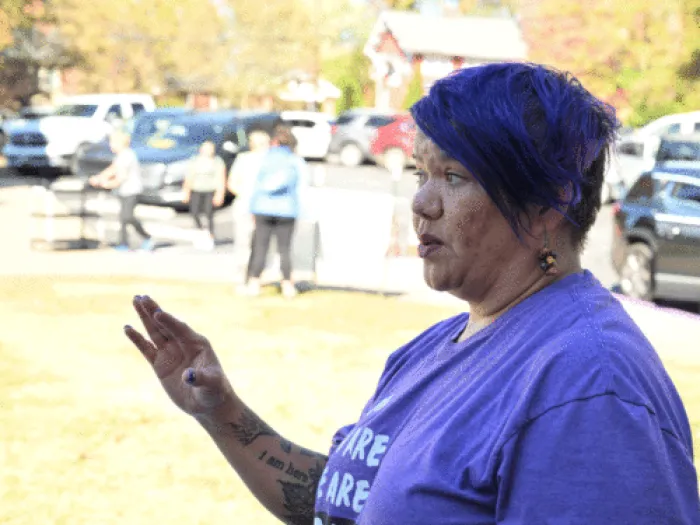Presbyterian pastor and activist the Rev. Dr. Liz Theoharis kicks off a webinar series designed to fight poverty and racism
Part 2, featuring musician and futurist Nicole Mitchell Gantt, is set for May 1

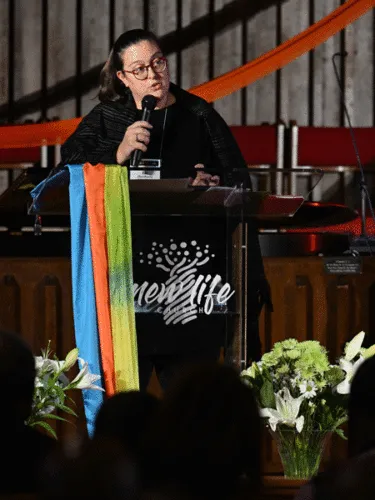
LOUISVILLE — The Rev. Dr. Liz Theoharis, a Presbyterian pastor who co-founded the Poor People’s Campaign and directs the Kairos Center for Religions, Rights & Social Justice, took 75 minutes Wednesday evening for the first of two scheduled Zoom conversations on the Matthew 25 Movement’s foci of eradicating systemic poverty and dismantling structural racism. Conversation hosts for the first installment of “Imagining a Future Beyond Systemic Poverty and Structural Racism” were Dr. Corey Schlosser-Hall, Deputy Executive for Vision & Innovation at the Presbyterian Mission Agency, and the Rev. Jermaine Ross-Allam, director of the Center for the Repair of Historic Harms.
Based in the City of New York, Theoharis was also an illuminating keynoter during the Matthew 25 Summit held in January. Borrowing a Disney term, Schlosser-Hall called Theoharis “an imagineer for what can be.”
“Jermaine and I are thinking about God sanctifying our imaginations, giving us a glimpse of what’s possible and thinking about ways that are possible that seem impossible today,” Schlosser-Hall said. Ross-Allam wondered if “we are selling short the image of God” if “we look at problems we caused and then tell ourselves, ‘These are problems we can’t solve.’”
Participants took a brief online survey to gauge their belief of their own efficacy in helping bring about God’s kin-dom over the next decade. Many responses were in the 6-8 range on a scale of 1-10.
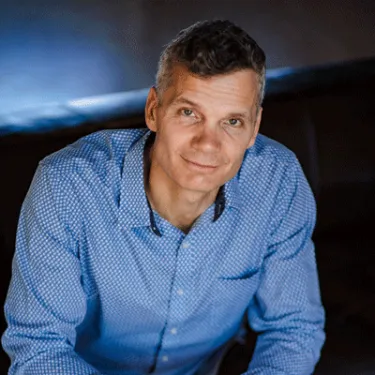
“That’s the crux of this conversation,” Schlosser-Hall said. “If we don’t sense we have any capacity to influence, we’re not likely to take actions … If we have a higher degree of connection to what could be and can imagine what could be, we think we have a higher probability of … taking actions that can lead to better outcomes.”
Conversation organizers are drawing on ideas from Jane McGonigal’s 2022 book, “Imaginable.” “Her concept is ‘time spaciousness,’” Schlosser-Hall said. If we can start thinking about what can happen over the next decade, “anything can come to pass.” The span between the Montgomery bus boycotts and the passage of the Civil Rights Act was nine years. It was 10 years between the first economic sanctions against South Africa for its system of apartheid and a new constitution that enfranchised all South Africans. “There’s something remarkable about a 10-year period,” Schlosser-Hall said. “If we can think about time spaciousness, it becomes more possible. We can set audacious goals like eradicating systemic poverty.”
Theoharis discussed the Kairos Center, a validated ministry of the Presbyterian Church (U.S.A.) that hosts Freedom Church of the Poor, among the PC(USA)’s 1001 New Worshiping Communities. It’s “for people who are tired of the ways Scripture and theology have been weaponized to spread a false narrative of scarcity,” Theoharis said.
“I have a lot of hope,” Theoharis said, repeating a theme she visited during her Matthew 25 Summit keynote. “It’s not a hope that things are not hard.” But “we are being disobedient to God’s call for justice for all. We are living in abundance. The only scarcity we have is the political will to address systemic poverty.”
Asked by Ross-Allam about how interpretations of Scripture can support or hinder justice efforts, Theoharis cited the Parable of the Widow and the Unjust Judge. “To me, it’s a story of agency of those who are the most impacted,” she said. “It’s clear the judge didn’t give a damn about others and didn’t care for God. At the end, the judge doesn’t change his position,” Theoharis pointed out. “He just knows this woman is persistent. In the Greek, he’s worried this woman will give him a black eye.”
Another person with agency in Luke’s gospel is the woman with the flow of blood, who spends everything she has on treatment. No one but Jesus can cure her. “Jesus’ followers are upset with her,” Theoharis said, “for asserting her agency.”
Some of Jesus’ disciples leave their low-wage jobs when he tells them, “I’ll teach you how to organize people” by teaching them how to fish for people, Theoharis noted.
“Genesis to Revelation is a constant revelation that things don’t have to be this way,” Theoharis said. She called it “this battle for the Bible, for the ways it shows a powerful movement led by those who are impacted and shows the way people in power warp and twist Scripture to benefit those with power and wealth.”
When we engage in interpreting biblical texts, we ought to “listen to and recognize the Good News to know it’s never separate from those at the bottom of society,” Theoharis said. “That’s something our congregations must and can engage with.” Another thing churches can do is partner “with those in our communities to help realize the kingdom of God here on Earth.”
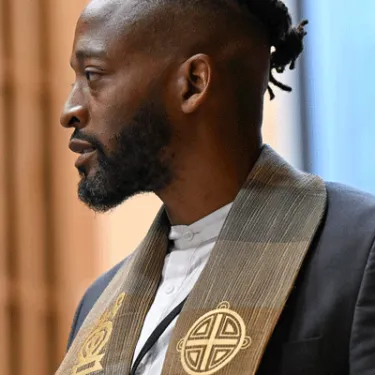
It was the Rev. Dr. Martin Luther King Jr. who said that too often, the church is more of a taillight than a headlight. “We want our churches to be taking the right side of justice and history,” Theoharis said. “When people move out into the world, the question is, will our churches move with them?” She recalled helping to organize restaurant workers in New York who were being paid a sub-minimum wage because they were also paid tips. “They said, ‘We can’t hold a prayer vigil outside our place of employment — but you as people of faith can.’ To me, that was an invitation to some folk in our congregation to pray and worship with low-wage workers, and through that they were able to earn a better contract.”
“There’s no division here,” she said of this kind of nonpartisan approach. “But how do we call ourselves out from being a taillight and becoming a headlight, pushing for justice for everyone? It works.”
Ross-Allam closed the webinar with prayer, thanking God “for inspiring us and helping us to remember that not only have you given us enough, but you made us enough to be the human beings we can and should be. We pray you will inspire us to be the change.”
The next webinar on imagining a future beyond systemic poverty and structural racism will be held at 7 p.m. Eastern Time on May 1. The guest will be musician, composer and futurist Nicole Mitchell Gantt. Register here.
You may freely reuse and distribute this article in its entirety for non-commercial purposes in any medium. Please include author attribution, photography credits, and a link to the original article. This work is licensed under a Creative Commons Attribution-NonCommercial-NoDeratives 4.0 International License.


